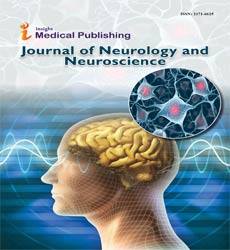Abstract
Composed Paraneoplastic Neurological Syndrome, Disseminated in Time and Space, in the Course of Non-Small Cell Neuro-Endocrine Lung Cancer
Introduction: Paraneoplastic neurological syndrome is a rare complication of different types of cancer. Non-small cell neuro-endocrine lung cancer is very rare and there are few descriptions of paraneoplastic syndrome in patients with such types of cancer. Paraneoplastic movement disorders, among them chorea, have an exceptionally rare occurrence.
Clinical presentation: A 64-year-old woman presented paraneoplastic chorea with non-typical coincidence of anti-Hu and anti-GD1b antibodies. Chorea was the last sign of the disease and was comorbid with encephalitis, chronic polyradiculoneuropathy and autonomic dysfunction; the clinical symptoms were disseminated in time. A very rare type of lung cancer i.e., poorly differentiated non-small cell neuroendocrine cancer was found.
Conclusions: The diversity of the clinical picture in this patient with non-small cell neuro-endocrine lung cancer can be explained by the complexity of the neurological pathomechanisms of paraneoplastic syndromes.
Author(s):
Edyta Dziadkowiak, Aleksandra Szczepanska, Joanna Bladowska, Slawomir Budrewicz, Ryszard Podemski and Magdalena Koszewicz
Abstract | Full-Text | PDF
Share this

Abstracted/Indexed in
- Google Scholar
- Open J Gate
- Genamics JournalSeek
- The Global Impact Factor (GIF)
- China National Knowledge Infrastructure (CNKI)
- Directory of Research Journal Indexing (DRJI)
- WorldCat
- Proquest Summons
- Scientific Journal Impact Factor
- Secret Search Engine Labs
- Euro Pub
Open Access Journals
- Aquaculture & Veterinary Science
- Chemistry & Chemical Sciences
- Clinical Sciences
- Engineering
- General Science
- Genetics & Molecular Biology
- Health Care & Nursing
- Immunology & Microbiology
- Materials Science
- Mathematics & Physics
- Medical Sciences
- Neurology & Psychiatry
- Oncology & Cancer Science
- Pharmaceutical Sciences

